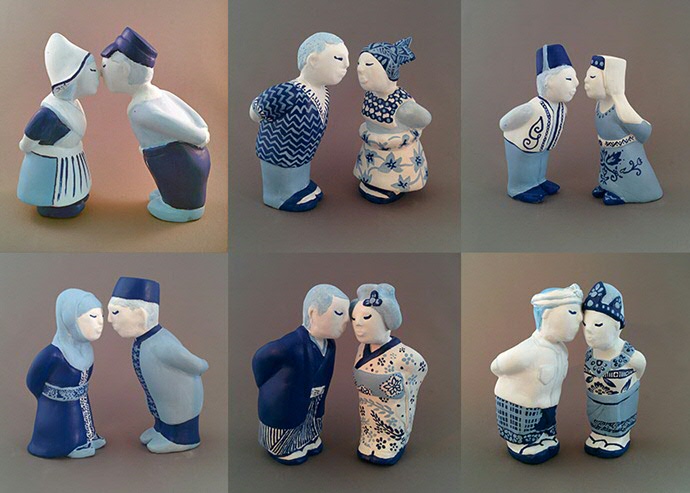19 september: presentatie rapport en beleidsbrief ‘Seksueel welzijn in de context van religieuze en culturele diversiteit’

Sinds 2016 hebben de Rijksuniversiteit Groningen en de Universiteit van Amsterdam in het door NWO gefinancierde onderzoeksproject ‘Cultural Encouters’ kwalitatief, etnografisch onderzoek gedaan naar de diverse manieren waarop gezondheid en seksueel welzijn worden benaderd door mensen met een Afrikaanse migratieachtergrond in Nederland en door gezondheidsorganisaties die zich in hun werk ook richten op het verbeteren van gezondheid en seksueel welzijn van mensen van Afrikaanse afkomst in Nederland. Op donderdagmiddag 19 september zullen bij het NIDI in Den Haag de onderzoeksresultaten en de naar aanleiding daarvan opgestelde Policy Brief met aanbevelingen voor beleid en praktijk worden gepresenteerd. Pers is van harte welkom.
Beleidsbrief
De beleidsbrief is namens het team van Cultural Encounters geschreven door dr. Brenda Bartelink, senior onderzoeker, en dr. Kim Knibbe, universitair hoofddocent Sociologie en Antropologie van Religie, beiden aan de Faculteit Godgeleerdheid en Godsdienstwetenschap van de Rijksuniversiteit Groningen. De Policy Brief legt uit welke kansen en uitdagingen er zijn in de benadering van gezondheid en seksueel welzijn onder mensen met een Afrikaanse (migratie)achtergrond, in het bijzonder wat betreft de rol die religie daarin speelt. Voorts wordt een tiental aanbevelingen gedaan aan beleidsmakers en professionals voor een betere aansluiting bij de religieuze benaderingen van seksueel welzijn.
Verbetering van de cultureel sensitieve gezondheidszorg en preventie
Dr. Brenda Bartelink over de aanleiding van het onderzoek: ‘In debatten over migratie in Nederland en Europa wordt religie vaak gezien als een probleem voor gender en seksualiteit. In Nederland zijn bijvoorbeeld een aantal controverses geweest rondom religieuze leiders van Afrikaanse afkomst, waarin werd aangenomen dat deze claimen dat HIV en aids genezen kunnen worden door gebed. In onderzoek dat eerder werd gedaan, door onder anderen Kim Knibbe in Nederland en mijzelf in Nederland en Oost-Afrika, werd dit beeld niet herkend. In veel van deze kerken is juist een grote waardering voor biomedische kennis en behandeling; wel is het zo dat er gebeden wordt voor mensen als ze problemen hebben met hun gezondheid, in hun relatie of gezin.
Nederland heeft een goed toegankelijke gezondheidszorg en ook preventie is van goede kwaliteit, toch kan er nog veel verbeterd worden in het aansluiten bij specifieke, kwetsbare groepen, zoals bij mensen met een Afrikaanse migratieachtergrond. Hiervoor is het belangrijk dat zorg en preventie cultuursensitief is en aansluit bij (religieuze) opvattingen en praktijken. Wij bieden op basis van ons onderzoek inzichten en strategieën om dat te realiseren. Het onderzoek brengt de expertise van onderzoekers van de RUG op het terrein van religieuze en culturele diversiteit in Nederland samen met de expertise van Dr. Rachel Spronk en haar team aan de UvA, dat gespecialiseerd is in seksualiteitsonderzoek.’
Onderzoek vanuit drie perspectieven
Bartelink: ‘We hebben met het team van Cultural Encounters kwalitatief, etnografisch onderzoek gedaan naar seksueel welzijn, religie en culturele diversiteit vanuit drie perspectieven: vanuit het perspectief van de individuele ervaringen van mensen met een Afrikaanse achtergrond in Nederland rondom gezondheid en seksueel welzijn, vanuit het perspectief van Afrikaanse kerken en religieuze leiders in Nederland, en ten derde vanuit het perspectief van gezondheidsorganisaties in Nederland. Uit het onderzoek kwam naar voren dat de benadering van gezondheidsorganisaties in Nederland niet voldoende aansluit bij hoe mensen van Afrikaanse afkomst in Nederland hun seksueel welzijn realiseren. Een voorbeeld: deelnemers aan ons onderzoek gaven vaak aan weinig vertrouwen te hebben in de gezondheidszorg en vaker naar religieuze leiders gaan als ze vragen en problemen hebben met betrekking tot seksueel welzijn. Religieuze leiders zijn weliswaar geen gezondheidsdeskundigen, maar ze kunnen met de ondersteuning mensen wel voorzien van de juiste informatie en hen verwijzen naar professionele hulp. Samenwerking met religieuze leiders is daarom van belang.’
Aanbevelingen voor beleid en praktijk
Deze en nog negen aanbevelingen die geformuleerd zijn naar aanleiding van de onderzoeksresultaten staan in de beleidsbrief die op donderdag 19 september door de onderzoekers gepresenteerd wordt. Vervolgens zal een rondetafelgesprek plaatsvinden over cultureel sensitieve gezondheidszorg en preventie, waarbij prof. dr. Agyemang, hoogleraar Migratie en Gezondheid bij het AMC, Dr. Marianne Cense van Kenniscentrum Seksualiteit Rutgers en Dr. Rachel Smith Theodore van Stichting Shepherd’s Place een reactie op de Policy Brief zullen geven.
Aanmelding
U kunt zich aanmelden voor het bijwonen van de presentatie van het rapport en de beleidsbrief ‘Seksueel welzijn in de context van religieuze en culturele diversiteit’ door een e-mail te sturen aan: policybriefing nidi.nl
- Wanneer: Donderdag 19 september 2019
- Aanvang: 15:00
- Einde: 17:00
- Waar: NIDI (Nederlands Interdisciplinair Demografisch Instituut), Lange Houtstraat 19, Den Haag
Meer nieuws
-
06 januari 2026
Geschiedenis dichterbij brengen
-
10 juni 2025
RUG en Rijksmuseum tekenen samenwerkingsovereenkomst
